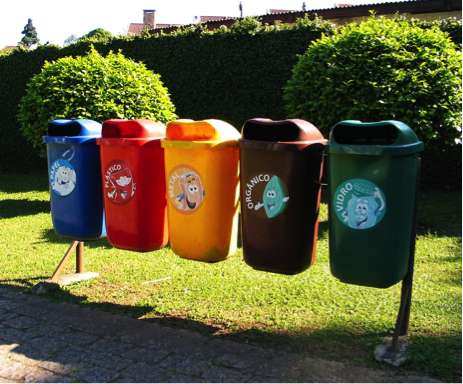Sustainable recycling is an environmentally responsible way to manage solid waste by dumping solid waste in landfills. Sustainable recycling helps us preserve natural resources and lessen the harm we bring to the environment and human health, unlike the current disposal techniques that endanger these things.
Sustainable recycling plants are specialized facilities designed to process recyclable materials in an environmentally responsible and efficient manner. We can collect and sort the garbage that residents produce in their houses and deposit it in the different fractions of containers in the city.
Their goal is to transform organic materials, cardboard, paper, plastic, and glass into resources that may be utilized to make new goods.
The following are some essential characteristics and procedures of sustainable recycling plants:
Efficient Material Sorting: It is an essential component of sustainable recycling facilities. it directly impacts the quality of recycled materials and the overall effectiveness of the recycling process. Advanced sorting and separation technologies are used by sustainable recycling processes to efficiently manage trash streams. This offers the separation of various materials for recycling, including paper, glass, plastics, metals, and organic waste. Effective material sorting minimises contamination it raises the quality of recycled materials and influences their market value. Through implementing advanced sorting technologies and processes, sustainable recycling plants can improve their overall performance.
Automated Sorting Equipment, Magnetic Separation, and Air Classification are some methods of this.
Reduced Waste Generation: One of the main objectives of sustainable waste management techniques is to reduce the amount of garbage generated. These facilities aim to minimize waste generation through effective recycling and waste diversion. Product Redesign, Reuse and Repair Programs, Waste-to-Energy (WTE) Conversion and Composting to reduce the quantity of material dumped in landfills, frequently set zero-waste or waste reduction objectives.
Energy Recovery: The process of extracting energy from waste materials that cannot be recycled or composted is known as energy recovery. energy recovery processes such as waste-to-energy processes. Energy recovery in sustainable recycling plants contributes to the overall sustainability of waste management systems by minimizing waste, conserving resources, and producing clean energy.
Quality Control: Quality Control is an essential component of sustainable Recycling Plans they ensure that the recycled materials meet industry standards and are of sufficient quality for their intended use. Proper quality control procedures minimise contamination, preserve the value of recyclables, and support the future sustainability of recycling operations. Periodic quality checks, Consistency in Sorting and Contaminant Removal are some key aspects of quality control in sustainable recycling plants.
Community Engagement: Participation from the community is essential to the success of sustainable recycling plants. Getting involved in the community creates an awareness of shared responsibility for the preservation of the environment, encourages appropriate trash management, and strengthens support for recycling activities. Sustainable recycling plants provide educational resources and conduct outreach programs to inform the community about the importance of recycling, waste reduction, and proper sorting of materials. Community Events and Workshops, Open Houses and Tours, Promotion of Recycling Programs and Public Awareness Campaigns Through these we can raise awareness about the importance of recycling, waste reduction, and sustainable practices. It helps build trust, encourages responsible recycling behaviours, and can lead to a more sustainable and environmentally conscious community.
Recycling facilities that are sustainable are essential for solving sustainability and environmental issues. These facilities play a significant role in the recycling industry by efficiently collecting, processing, and reusing materials, which helps to reduce waste, conserve natural resources, and decrease the environmental impact.
Here are some main arguments why sustainable recycling plants matter:
Resource Conservation: Resource conservation is one of the main objectives of recycling plants. They are designed to effectively gather, handle, and recycle various materials to ensure that valuable resources are conserved. Recycle plants must follow resource conservation to reduce the loss of natural resources, save energy use, and decrease the negative environmental effects of resource extraction and manufacturing. It is essential to moving towards a more sustainable and circular economy.
Waste Reduction: Waste reduction is the process of reducing the amount of garbage produced and the environmental damage that comes with disposing of waste. It includes strategies and processes designed to reduce waste generation, reuse objects, and recycle materials to ensure that fewer resources end up at disposal sites or burning facilities. Reducing waste is essential to both environmental preservation and sustainable resource management. Reducing waste helps to create a cleaner and more sustainable environment by minimizing pollution and conserving resources.
Energy Savings: Recycling plants use a variety of strategies and processes to help reduce energy use. One of the main ways that recycling helps the environment is through these energy savings. Recycling plants play a critical role in minimizing carbon emissions and reducing the environmental effect of industrial operations by lowering the energy needed for resource extraction and manufacture. These energy savings contribute to making resource management more ecologically friendly and sustainable.
Job Creation: Sustainable recycling plants create employment opportunities, and this aspect contributes to their positive impact on local economies. Sustainable recycling plants not only provide a wide range of employment possibilities, but they also frequently make themselves available to people with different skill sets and educational backgrounds. Furthermore, these positions might be especially crucial in areas aiming to advance environmental sustainability and economic growth.
Sustainable recycling facilities are essential components of a more sustainable and environmentally responsible society. They generate income possibilities, increase public knowledge of responsible resource management, and aid in resource conservation, waste reduction, and environmental impact mitigation. sustainable recycling plants matter because they contribute to a cleaner environment, resource conservation, and a more sustainable future for our planet.
- About the Author
- Latest Posts
A passionate advocate for all natural and sustainable ideas. With a background in sustainable economics science and a deep love for nature, Sojy has dedicated his career to promoting eco-friendly practices and encouraging others to live a more sustainable lifestyle. He is an avid hiker, gardener, and cook, and loves experimenting with natural ingredients in his recipes and lifestyle routines. Sojy believes that small changes can make a big impact and is constantly seeking out new ways to reduce his carbon footprint and inspire others to do the same




